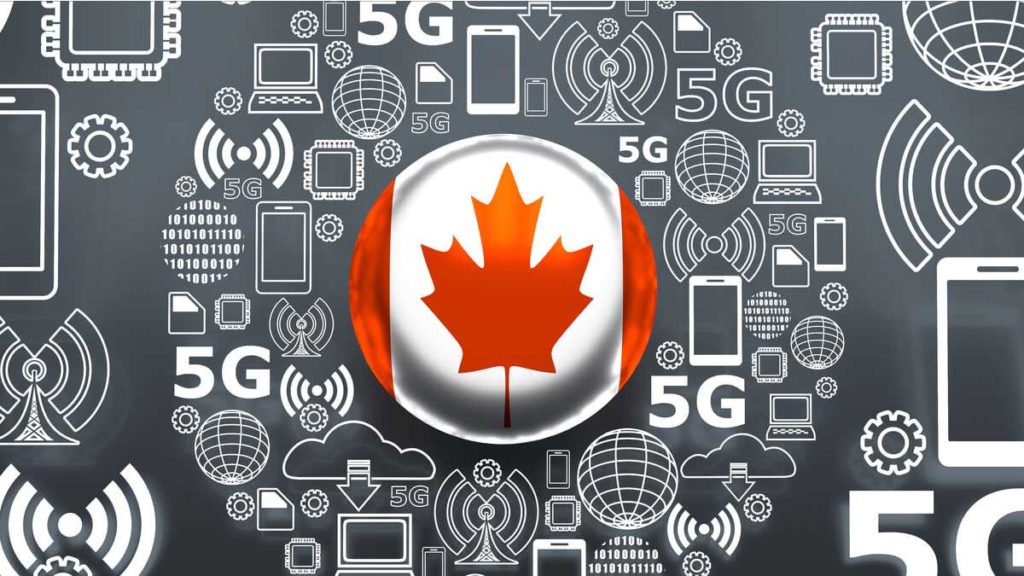
China is losing the battle against the United States and now, Huawei’s dream to become the leader of the Canadian 5G market has ended. In fact, three Canadian Telecom giants have decided to collaborate with Ericsson and Nokia to rollout 5G networks.
According to the government of Canada website, The Communication Research Center Canada (CRC) started working on 5G technology since 2014 and they began demonstrating the technology starting 2017.
The fifth-generation technology is critical to Canada, as it will help industries, government, and governmental agencies. According to a study conducted by Accenture Strategy, 5G will help reduce time stuck in traffic by 10% using smart traffic management. In addition, 5G technology can diminish the use of pesticides by 85% due to precision agriculture technologies. According to Wired Guide to 5G, the estimated economic impact of 5G deployment in Canada will reach $40B of annual GDP uplift with 250K permanent jobs added to the economy by 2026.
On June 2, 2020, Canadian communications service provider Bell Canada selected Ericsson 5G Radio Access Network (RAN) technology to support its nationwide 5G mobile and fixed wireless access deployment, according to the Sweden-based company Ericsson. However, it has put the technology on hold due to the Covid-19 pandemic. Bell CEO Mirko Bibic said during a conference: “Customers are not paying attention to this technology right now, they have other priorities”. Moreover, he added, “We are ready with our initial 5G network, but frankly we don’t think it’s the right time now to officially launch it for marketing purposes”.
On the other hand, Telus announced it has selected Ericsson and Nokia to support building its 5G network, with the goal to revolutionize wireless connectivity for customers. This came out after the company suggested it would use Huawei equipment. Back to February 14, 2020, Telus avowed that the deployment of its 5G technology wireless network could be delayed and more expensive if Ottawa chooses to ban equipment from Huawei, according to Global News. Nevertheless, all scenarios are under control. “A ban on Huawei 5G equipment wouldn’t “impact the timing of when Telus brings 5G to market,” said Telus Chief Executive Officer Darren Entwistle.
Telus has invested almost $148 million in network infrastructure, spectrum, and operations to enhance the coverage and speed of its network in the Canadian 5G market. Moreover, it has committed to invest a further $40 billion over the 3 years to support the roll-out of 5G networks.
Since March 6, 2020, Canadians have access to 5G at no extra charge. This service offered by Rogers Communications would last until March 6, 2021 after which, Canadians will have to pay a $15 surcharge. Rogers, on the other hand, started its 5G rollout in January with vendor Ericsson. In fact, on January 15, 2020, Rogers officially turned on its Wireless 5G network in the Downtown area of Toronto, Ottawa, Vancouver, and Montreal. However, devices were not authorized to connect to it. Jorge Fernandes, Chief Technology Officer said, “Over the next 12 to 18 months, a 5G stand-alone core will become available”.
On June 5, 2020, the Minister of Innovation, Science and Industry, Navdeep Bains announced the delay of a planned auction of 3,500-megahertz wireless spectrum. This decision will allow the telecommunications industry to maintain its focus on providing essential services to Canadians as a response to Covid-19.
There were 1506 licenses available in the auction initially set for December 15, 2020. Canada will be split into 172 geographic locations where the licenses will be distributed. In addition, different amounts of spectrum will be available for each area. These licenses will be considered ‘flexible’. Carriers will be able to decide what services the band will be used for- 5G networks or fixed wireless services. The sum of all opening bid prices is $558 million.
During an interview with Yahoo Finance Canada, Minster Bains said that Telus and Bell have to reduce their prices by 25% target for plans that offer 2GB to 6GB of data “in the next two years.” Reductions in high-end plans and low-end plans have happened in the past but targeting the area between two and six is so important because the average Canadian uses 2.5GB per month. These companies will be held accountable by producing quarterly updates that will be available to the public according to Bains.
Senior military officials have told the Canadian Government to ban Huawei as it might pose a national security threat. In fact, Canada is the only country in the five-eye intelligence-sharing alliance that did not execute a ban on Huawei. Other countries in the alliance are Australia, New Zeeland, the UK, and the US. Recently, UK PM Boris Johnson’s decision regarding Huawei was critical because if the UK breaks its ties with Huawei it might persuade the Canadian authorities to take similar steps.
In May 2020, Philip Lind, Vice-Chairman of Rogers Communications said that Huawei would be a real threat to Canada and should be banned from its 5G network. As such, Rogers Communications announced a three-year partnership with Communitech to open a new 5G innovation lab that will accelerate and launch smart city, IoT, and enterprise 5G applications.
On May 26, 2020, Prime Minister Justin Trudeau said that the government have not yet decided if they will partner with Huawei. He pointed out that the government is still consulting a security agency in order to come to a decision regarding the China telecom giant.